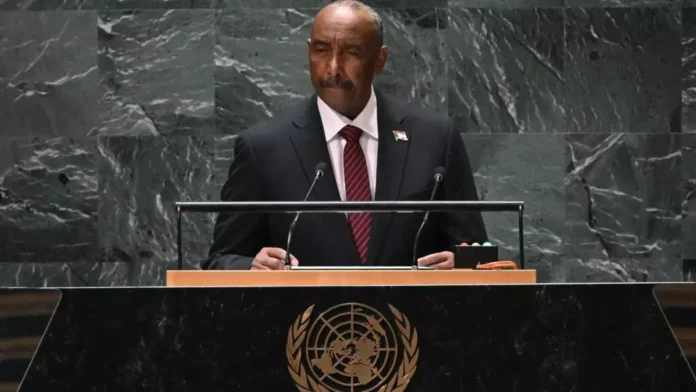Sudanese Sovereignty Council member and army deputy commander Yasser al-Atta expressed on Wednesday the army’s readiness to negotiate with the Rapid Support Forces (RSF), provided that “they withdraw to camps outside the cities.”
Al-Atta made the remarks during a speech in the city of El-Obeid, North Kordofan State, at a ceremony marking the graduation of “Popular Resistance” volunteers fighting alongside the army against the RSF, according to Anadolu Agency.
“In a few days, the military command center of the state will move here (El-Obeid), which will become a beehive from which we will launch operations to liberate the homeland,” al-Atta said.
Since the outbreak of the war with the RSF in April 2023, the army has been directing operations from its headquarters in the capital Khartoum and the temporary administrative capital, Port Sudan, in the northeast.
Al-Atta said the army had prepared for ongoing and upcoming operations “to liberate all Sudanese territories,” pledging to “recapture the Kordofan and Darfur states soon” from the RSF.
Currently, the RSF controls the five states of the Darfur region in western Sudan, except for parts of North Darfur, while the army maintains control over most of the remaining 13 states, including the capital.
The general reiterated the army’s willingness to negotiate “under clear conditions,” stressing that the RSF “must withdraw from all towns and cities, regroup its forces in camps in East and South Darfur, and hand over its weapons to the army.”
He also demanded the “departure of foreign mercenaries fighting alongside the RSF, prosecution of those who committed crimes, and either demobilization or reintegration of the rest.”
“This is the peace we know,” al-Atta declared, adding that “the RSF leadership has no place in Sudan and will be brought to justice.”
Al-Burhan Calls on Trump to Intervene
In a related development, Sudanese army chief and Sovereignty Council head Abdel Fattah al-Burhan urged former U.S. President Donald Trump to help bring peace to Sudan, in an opinion piece published by The Wall Street Journal.
“The Sudanese people are now looking to Washington to take the next step — to build on the integrity of the American president and work with us, and with those sincerely seeking peace in the region, to end this war,” al-Burhan wrote.
He described Trump as “a leader known for speaking plainly and acting decisively,” adding that “many Sudanese believe he is determined to confront the foreign actors prolonging our suffering.”
Al-Burhan praised remarks by U.S. Secretary of State Marco Rubio at the G7 summit, calling them “a turning point” because they “called the war by its name and directly blamed the RSF for the violence and abuses.”
He said Rubio’s comments on “the external role in fueling the conflict were clear and candid,” noting that such clarity is “rare in international discourse,” which often portrays Sudan’s war “as a fight between two generals.”
Partnership Against Terrorism and the Abraham Accords
Al-Burhan described Trump’s statements after meeting Saudi Crown Prince Mohammed bin Salman as “positive and encouraging,” expressing Sudan’s readiness to work with Washington and Riyadh “to achieve the peace long sought by the Sudanese people.”
He affirmed Sudan’s readiness to be “a strong partner of the United States in combating terrorism and promoting regional stability,” warning that the ongoing war threatens “not only Sudan but also the Red Sea, the African Sahel, and U.S. interests.”
The army leader highlighted Sudan’s aspiration to “restore its role as a constructive regional power,” noting that joining the Abraham Accords in 2021 “was a historic step reflecting Khartoum’s belief that peace and cooperation are the path to a stable Middle East and Horn of Africa.”
Diplomatic Moves and the Quad’s Plan
In September 2025, the international “Quad” — comprising the United States, Saudi Arabia, Egypt, and the United Arab Emirates — proposed a three-month humanitarian truce in Sudan as a prelude to a permanent ceasefire and a nine-month inclusive transition leading to a civilian government.
Despite continuing atrocities by the RSF against civilians and its territorial gains in Darfur and Kordofan, RSF leader Mohamed Hamdan Dagalo (Hemetti) announced a unilateral three-month ceasefire.
However, Al-Burhan rejected the Quad’s plan, arguing it “abolishes the national army, dissolves state security institutions, and allows the rebel militia to remain in the areas it occupied.”
Even so, the Sudanese government reaffirmed its willingness to negotiate under a “roadmap” it submitted to the United Nations, which stipulates the RSF’s withdrawal from all cities and civilian facilities to enable the return of tens of thousands of displaced people to their homes.


